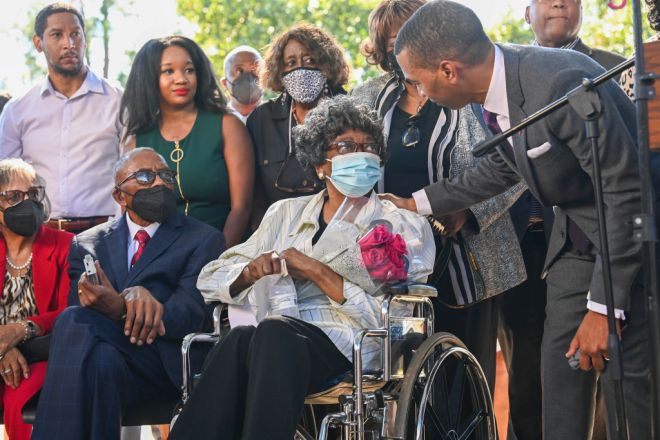
Source: Craig Barritt / Getty
Civil rights pioneer, Claudette Colvin is still seeking justice over 60 years later.
Back in March 1955, a then 15-year-old Colvin was arrested after she refused to give up her seat to a White person on a bus in Alabama. Now, the freedom fighter is seeking to get her conviction expunged. The Montgomery native was charged with a felony for assaulting an officer along with two counts of violating the city’s former segregation law. Colvin filed a motion on Oct. 26 asking the courts to destroy her outdated criminal record, CNN reported.
“I guess you can say that now, I’m no longer a juvenile delinquent,” she told reporters at a news conference on Oct. 26. “Under Jim Crow, the bus driver had the authority to ask you to give up your seat to a White person and that was absolutely wrong.”
Phillip Hoose details Colvin’s heated encounter with law enforcement in his book Claudette Colvin: Twice Toward Justice. Officers dragged and kicked Colvin as they forced her off the bus that dreadful day in 1955. The vicious policemen took Colvin down to the station where they mocked her and even attempted to guess her bra size. “We were treated like second-class citizens,” she explained.
Colvin was later convicted on all counts of her assault and felony charges, but the Montgomery court later overturned her segregation conviction. She was then placed on “Indefinite probation” for the police officer assault conviction and was never informed that her probation ended when she became of age, her attorney, Phillip Ensler, told CNN.
RELATED CONTENT: Nine People Every Black Woman Should Know: Claudette Colvin to Sloane Stephens

Source: Julie Bennett / Getty
According to The New York Times, Colvin moved to the Bronx after her conviction, but the trailblazer returned to Montgomery during the height of the bus boycott movement, which Rosa Parks sparked nine months after her incident. Parks has been widely regarded as an integral figure in abolishing bus segregation. While Colvin arguably started the revolution, Black leaders felt as though Park’s would be more suitable as the face of the movement because she was older, married and had lighter skin.
“My mother told me to be quiet about what I did,” Colvin told The New York Times in 2009. “She told me: ‘Let Rosa be the one. White people aren’t going to bother Rosa — her skin is lighter than yours and they like her.’” Civil rights activists felt as though Rosa could win over the White community with her image. At just 15-years-old, Colvin, who is of a darker complexion, was a single mother during the time of her incident.
According to court documents, Colvin filed her petition in family court in Montgomery County, where her case was processed in 1955. The petition said that Ms. Colvin’s record “serves in the interest of justice and further, acknowledges her integral role in the civil rights movement.”
Colvin told reporters Tuesday that the move was bigger than justice.
“I’m not doing it for me, I’m 82 years old. But I wanted my grandchildren and my great-grandchildren to understand that their grandmother stood up for something very important and that it changed our lives a lot, changed attitudes,” she said.

0 Commentaires